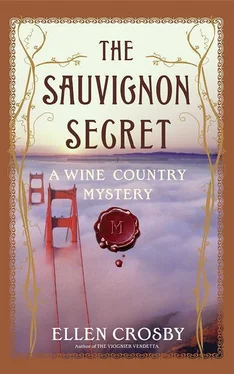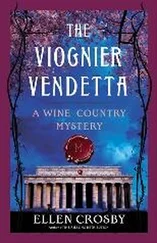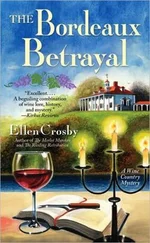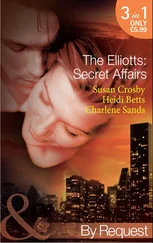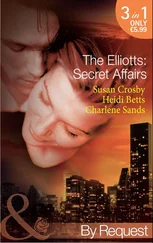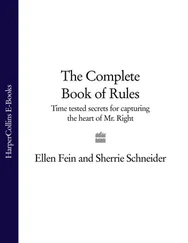It appeared as though Charles materialized out of nowhere, until I noticed the door set into a wall that had been camouflaged to look like a bookcase. He was holding something partially obscured in his hand. For a wild moment I thought it might be a gun. Maybe I’d been right after all: He had come to have a man-to-man talk with Pépé about his wife’s infatuation with my grandfather. But when he raised his arm I saw that it was a wine bottle, dark like the color of old blood.
“I didn’t mean to startle you both. I went in through the cave to get the wine and came through the back door.” He opened and closed it again so we could see the neat trick of how it disappeared into the wall. “Clever, isn’t it?”
He crossed the room and flicked a switch next to an oil painting of a pair of foxhounds. Instantly a fire blazed to life in the stone fireplace.
My grandfather looked surprised and Charles grinned. “Gas,” he said. “I know it’s a lazy man’s way of getting out of building a real fire, but I enjoy it. No need to wait for it to burn down at the end of an evening.”
So this was the refuge he retreated to when he wanted to get away from … what? Or whom? I wondered if Juliette had even seen the inside of this place.
“Do you spend much time here?” I asked.
He gave me an indecipherable look and said, “Depends on your definition of ‘much.’ ”
I decided not to ask the obvious follow-up.
“Please, come and sit by the fire,” he said, “while I pour the wine. I had it opened about an hour ago. I’d like to see how it’s developing. It might need a little more time.”
He handed me a glass and I nearly dropped it. Silk-screened on the wineglass was the logo of the openmouthed alienlike figure that had been on the broken glass in Paul Noble’s studio. He handed Pépé a similar glass and took a third for himself.
“Is anything wrong?” he asked.
I looked into his eyes and saw a shadow pass behind them. What-ever his reason for bringing us here, now it seemed it had something to do with the death of Paul Noble. Somehow Charles had learned that I’d found Paul hanging in his studio and he knew about the wineglass, too. I wondered who had told him and when this game was going to end. I was tired of being played.
“I saw a wineglass with the same design on it the other day, but you know that already, don’t you?” I said in a curt voice. “Where did you get these? They look like old glasses, not the inexpensive ones we give out as souvenirs at the winery.”
“Lucie—” Pépé cautioned me.
“They are,” Charles said. “I haven’t used these glasses in more than forty years.”
“Why tonight? A celebration? Or is it in memoriam? And shouldn’t we be drinking Sauvignon Blanc?”
Charles’s mouth tightened. “You’re right,” he said. “The Margaux will have to do. It’s from the correct year.”
I looked at the bottle. “What happened in 1970?”
“I’ll get to that. Now, please, have a seat.”
He waited until Pépé took one of the leather chairs and I sat on the sofa before he sat down in the other wing chair. The fire flickered merrily.
“Do you mind if I smoke?” My grandfather indicated a large glass ashtray on the coffee table.
I’d noticed it earlier. The White House logo was etched into the glass, probably a souvenir from another era, in the days when nobody minded if the president lit up and dinners ended with brandy and cigars in one of the formal state rooms.
Charles pushed the ashtray over to Pépé. “Be my guest. Juliette doesn’t come here. She’s absolutely against tobacco, and don’t get her started on hunting.”
He smiled without amusement and raised his glass. “Thank you both for indulging me.”
Pépé and I raised our glasses in silence. The wine was out of this world.
“I’m going to tell you a story,” he said, “and I’d appreciate it if you would let me tell it my way. I promise I’ll answer all your questions when I’m finished.”
Pépé snapped his lighter shut and it made a little metal clink. He slipped it in his pocket and took a drag on his cigarette, closing his eyes. I kicked off my sandals, tucking my feet under my long dress and laying my pashmina across my lap like a blanket. Pépé’s jacket was still around my shoulders and I pulled it close. Charles settled back into his chair and receded into the shadows.
“In 1970, Nixon was still in the White House,” he said, “but it wouldn’t be long before he got mired in Watergate and it brought him down. We were still in Vietnam, the ’68 riots had ended but they still left vivid scars on the national conscience, and the war, which had ended Johnson’s presidency, was more unpopular than ever. Nixon wanted to get us out of there and he did, calling it ‘peace with honor.’ Our worst enemies were the Sovs and it was the height of the Cold War.”
Pépé crossed one leg over the other and exhaled a stream of smoke. Like Charles, he’d lived through these years. The history lesson was clearly for my education.
“I was a history major in college,” I said. “So I did read about all this, you know.”
Charles made a small noise and Pépé chuckled.
“Ah.” Charles’s voice was dry. “Ancient history?”
“Prehistoric.”
“I see,” he said after a moment. “ ‘I know of no way of judging the future but by the past.’ Do you know who said that, history major?”
“You?”
“Patrick Henry.”
“ ‘Give me liberty or give me death’?”
“The same. A Virginian. A Founding Father. The lesson applies now, too.”
“You’ll explain that?” I said. “I won’t need to.” He sipped his wine. “In 1970, I was the Deputy Director for OSPR.”
“English, please,” I said. “For the uninitiated?”
“The Office of Strategic Programming and Research. Later it went under the Pentagon’s umbrella, so it became DOSPR. D for ‘Defense.’ Dosper was one of the most nimble and competent agencies in the federal government. The jewel in the Defense Department’s crown. You wanted something done, that was the place to go. No bureaucratic red tape to snarl you, no congressional hearing to ask permission first. We had carte blanche to make it rain.”
“How convenient,” I said. “What exactly did this organization do?”
“Oh, remnants of it still exist. But the original program was started in the late fifties, when the Sovs caught us off guard with Sputnik. They beat us in the space race and we had no clue what was up their little Commie sleeves. You can’t imagine how devastating that was.”
Pépé nodded and I stared at both of them, wondering what it must have been like during the years when our former World War II ally had become the “Evil Empire” and people like Charles called the Russians “Commies” and “Sovs” like something out of an old spy movie.
Charles drank his wine. “So in order for us never to fall behind, and for that never to happen again, we set up a sort of freewheeling think tank of creative people who spent their days playing military what-if and then figuring out how to invent the technology. You’ve benefited from some of the results … advancements like global positioning systems, voice-recognition software, things like that. It wasn’t just building things that went boom or the next James Bond–type toy to put in the arsenal. The sign on the door to my office was a quote from Einstein: ‘If we knew what we were doing, it wouldn’t be called research.’ ”
He shifted in his chair. No one laughed.
“The wine is really opening nicely, isn’t it?” He stared into his glass. “Still got some life in it after all these years.”
I nodded, wishing he’d get on with it. Charles was leading up to something important, but at this rate we’d still be here tomorrow morning.
Читать дальше
